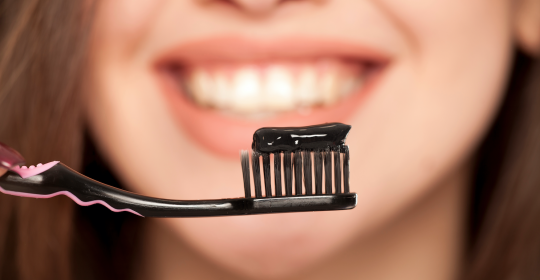
The Truth About Charcoal Toothpaste: Does it Really Whiten Teeth?
Like many others pursuing pearly whites, you might be looking for different whitening solutions, other than a professional treatment at the dentist. And when you encounter one such as charcoal toothpaste, that is natural AND affordable, you might be tempted to jump the gun. Who could blame you?
The question on everyone’s lips is: does charcoal toothpaste really work? Read on to find out the truth from our dental experts.
How effective is charcoal toothpaste?
The idea of using activated charcoal to whiten teeth isn’t just another internet fad. In fact, it started almost a century ago, when charcoal chewing gum and powders were rolled out as whitening treatments in America. Fast-forward a few decades and the health-concerned consumer can now purchase a range of products containing charcoal, from floss and toothpaste to special toothbrushes.
But how true are the claims that charcoal will brighten your smile?
The answer is mixed. On one hand, it does have a slight whitening effect on the teeth after a few weeks of use, as shown by a number of small studies. That, however, is not enough to make up for the possible damage it might do in the long run.
Charcoal contains abrasive particles that can damage the surface of the teeth (enamel), which may weaken the teeth and lead to sensitivity and also higher vulnerability to further yellowing.
That’s not the only bad news. As it turns out, charcoal contains no less than four substances that have been classified as carcinogens. Charcoal toothpaste also contains bentonite clay, which can also be carcinogenic. And while these substances would be found in very small amounts in these dental hygiene products, the concern is that people would use them much more often than they should, just to get results faster. Long-term use of any charcoal product can damage the teeth and expose the body to dangerous substances.
What can you use instead of charcoal toothpaste?
A safer and more effective alternative are over-the-counter treatments that use peroxides as a whitening agent. These aren’t completely safe either, but they definitely surpass charcoal products. After this type of whitening treatment, you may experience sensitivity and gum irritation for a short while.
There are a number of whitening treatments you can get from your dentist and apply yourself, in the comfort of your own home. However, many times the wisest thing to do if you’re chasing a beautiful white smile is to stay away from the foods that stain your teeth!
Last but not least, you can always opt for a professional teeth whitening treatment that will get you the best results without damaging your teeth. It might be a little more expensive, but it’s a perfect example of the old adage “You get what you pay for”.
Have any questions regarding whitening treatments? Just get in touch with your friendly dentist in Bellbowrie.
Leave a reply →






Most Commented